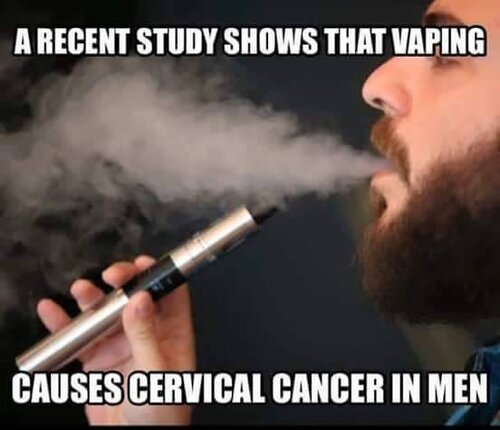https://www.planetofthevapes.co.uk/news/health-studies/2021-01-13_vapers-twitter-and-covid.html
Vapers, Twitter and COVID
Posted 13th January 2021 by Dave Cross

Public conversation about the viral pandemic has recently been rivalled by a debate over the role of social media in modern society. What better time for a trio of researchers to drop their study about vapers on Twitter discussing the evidence surrounding vaping and developing severe Covid-19 symptoms.
The study is published by JMIR Public Health and Surveillance journal, which describes itself as: “A multidisciplinary journal that focuses on public health and technology, public health informatics, mass media campaigns, surveillance, participatory epidemiology, and innovation in public health practice and research”.
Authors Yankun Gao, Zidian Xie, and Dongmei Li work at the Department of Clinical & Translational Research at the University of Rochester Medical Center.
Despite noting that there is a strikingly low number of current smokers and vapers presenting as COVID-19 patients with severe symptoms at hospitals around the world, the trio claim: “Electronic cigarette (e-cigarette) users might be more vulnerable to COVID-19 infection and could develop more severe symptoms.”
That statement isn’t grounded in fact, hence the would-could-should nature of the comment, they rely on statistical manipulation of hard data.
“It is important to characterize how e-cigarette users perceive the COVID-19 pandemic and how their perception differs from that of non-users,” they write. “Understanding the attitudes of e-cigarette users toward the COVID-19 pandemic and topics discussed by them on Twitter could help public health workers and policymakers take appropriate actions such as encouraging e-cigarette users to quit vaping during the current COVID-19 pandemic.”
Laying out their bias with a statement that vapers are more likely to be admitted to hospital than non-vapers indicates that they are less concerned with informing public health and more interested in piggybacking on COVID-19 and conversations about Twitter censorship to promote themselves in an exercise in publicity and fund seeking.
Tweets were collected using the keywords: “e-cig,” “e-cigs,” “Ecig,” “Ecigs,” “electroniccigarette,” “Ecigarette,” “Ecigarettes,” “vape,” “vapers,” “vaping,” “vapes,” “e-liquid,” “ejuice,” “eliquid,” “e-juice,” “vapercon,” “vapeon,” “vapefam,” “vapenation,” and “juul”.
They were then filtered using keywords: “CORONA,” “corona,” “COVID19,” “covid19,” “covid,” “coronavirus,” “Coronavirus,” “CoronaVirus,” and “NCOV”.
The resulting collection was then cleaned of all vendor and promotional related posting: “From the COVID-19 tweets collected, we identified 11,479,773 tweets from 2,511,659 unique Twitter users in the non-Ecig group and 4,500,248 tweets from 187,399 unique Twitter users in the Ecig group.”
They concluded: “The differences between Ecig and non-Ecig group users’ attitudes toward the COVID-19 pandemic indicated a good opportunity to educate e-cigarette users about the potential harms of vaping and encourage them to quit vaping during the COVID-19 pandemic.”
Then the authors engage in pure speculation: “One of the top topics unique to the discussion in the Ecig [user] group was death and virus spread. The concerns in the Ecig group about the virus spread and COVID-19–related deaths might be related to the discussions that vaping may increase the risk of severe COVID-19 infection.”
Finally, no decent hatchet job can pass by without a spurious reference to the EVALI lung injury outbreak – despite it not being associated with vaping – even though they admit near the end of their work that, “currently, there is a lack of evidence that e-cigarette users are more susceptible to COVID-19 infection and death”.
Still, they can hope the missing evidence comes to light so they can justify this waste of time and resources.
Vapers, Twitter and COVID
Posted 13th January 2021 by Dave Cross

Public conversation about the viral pandemic has recently been rivalled by a debate over the role of social media in modern society. What better time for a trio of researchers to drop their study about vapers on Twitter discussing the evidence surrounding vaping and developing severe Covid-19 symptoms.
The study is published by JMIR Public Health and Surveillance journal, which describes itself as: “A multidisciplinary journal that focuses on public health and technology, public health informatics, mass media campaigns, surveillance, participatory epidemiology, and innovation in public health practice and research”.
Authors Yankun Gao, Zidian Xie, and Dongmei Li work at the Department of Clinical & Translational Research at the University of Rochester Medical Center.
Despite noting that there is a strikingly low number of current smokers and vapers presenting as COVID-19 patients with severe symptoms at hospitals around the world, the trio claim: “Electronic cigarette (e-cigarette) users might be more vulnerable to COVID-19 infection and could develop more severe symptoms.”
That statement isn’t grounded in fact, hence the would-could-should nature of the comment, they rely on statistical manipulation of hard data.
“It is important to characterize how e-cigarette users perceive the COVID-19 pandemic and how their perception differs from that of non-users,” they write. “Understanding the attitudes of e-cigarette users toward the COVID-19 pandemic and topics discussed by them on Twitter could help public health workers and policymakers take appropriate actions such as encouraging e-cigarette users to quit vaping during the current COVID-19 pandemic.”
Laying out their bias with a statement that vapers are more likely to be admitted to hospital than non-vapers indicates that they are less concerned with informing public health and more interested in piggybacking on COVID-19 and conversations about Twitter censorship to promote themselves in an exercise in publicity and fund seeking.
Tweets were collected using the keywords: “e-cig,” “e-cigs,” “Ecig,” “Ecigs,” “electroniccigarette,” “Ecigarette,” “Ecigarettes,” “vape,” “vapers,” “vaping,” “vapes,” “e-liquid,” “ejuice,” “eliquid,” “e-juice,” “vapercon,” “vapeon,” “vapefam,” “vapenation,” and “juul”.
They were then filtered using keywords: “CORONA,” “corona,” “COVID19,” “covid19,” “covid,” “coronavirus,” “Coronavirus,” “CoronaVirus,” and “NCOV”.
The resulting collection was then cleaned of all vendor and promotional related posting: “From the COVID-19 tweets collected, we identified 11,479,773 tweets from 2,511,659 unique Twitter users in the non-Ecig group and 4,500,248 tweets from 187,399 unique Twitter users in the Ecig group.”
They concluded: “The differences between Ecig and non-Ecig group users’ attitudes toward the COVID-19 pandemic indicated a good opportunity to educate e-cigarette users about the potential harms of vaping and encourage them to quit vaping during the COVID-19 pandemic.”
Then the authors engage in pure speculation: “One of the top topics unique to the discussion in the Ecig [user] group was death and virus spread. The concerns in the Ecig group about the virus spread and COVID-19–related deaths might be related to the discussions that vaping may increase the risk of severe COVID-19 infection.”
Finally, no decent hatchet job can pass by without a spurious reference to the EVALI lung injury outbreak – despite it not being associated with vaping – even though they admit near the end of their work that, “currently, there is a lack of evidence that e-cigarette users are more susceptible to COVID-19 infection and death”.
Still, they can hope the missing evidence comes to light so they can justify this waste of time and resources.






